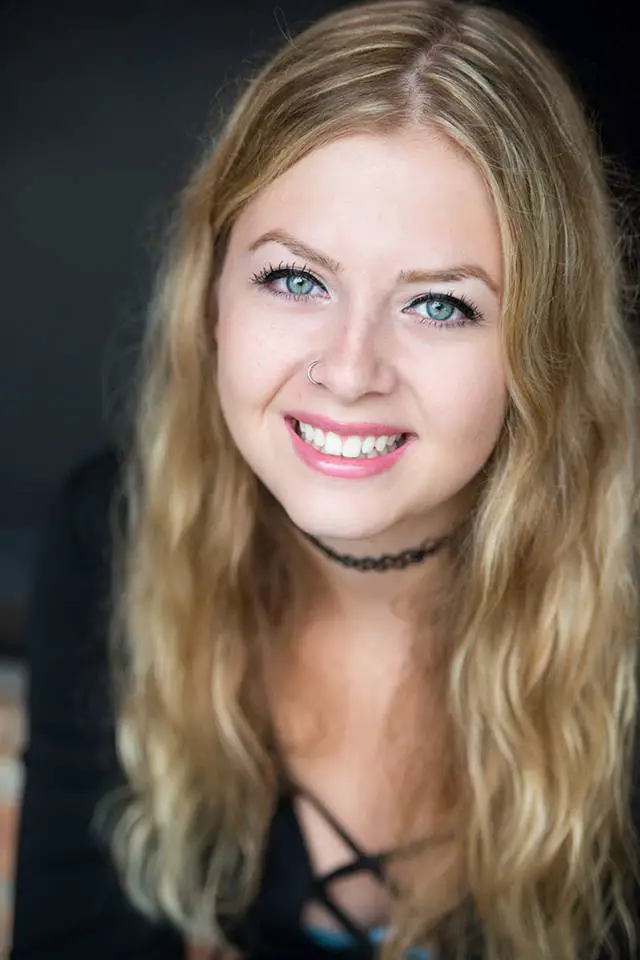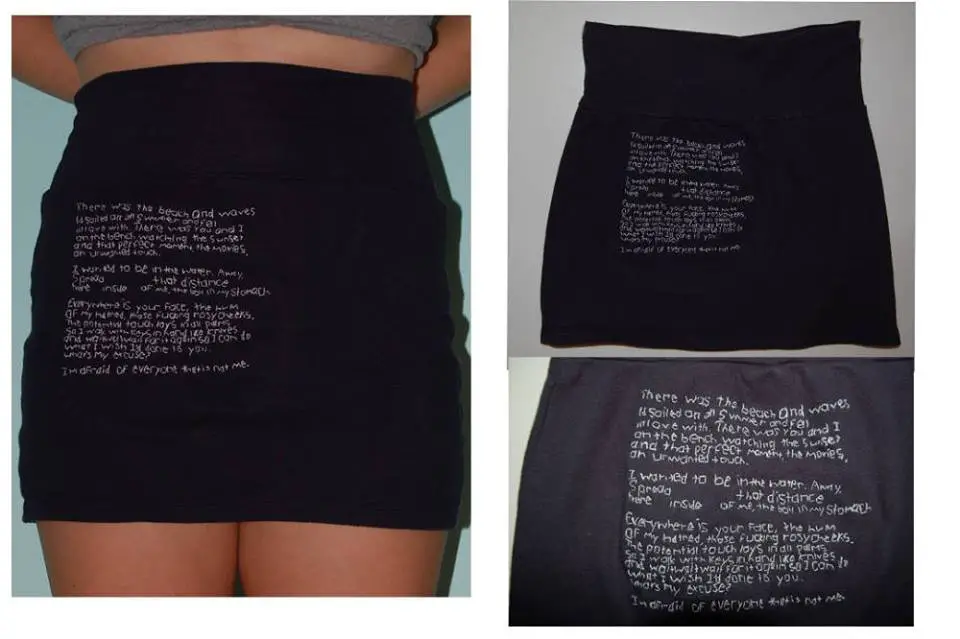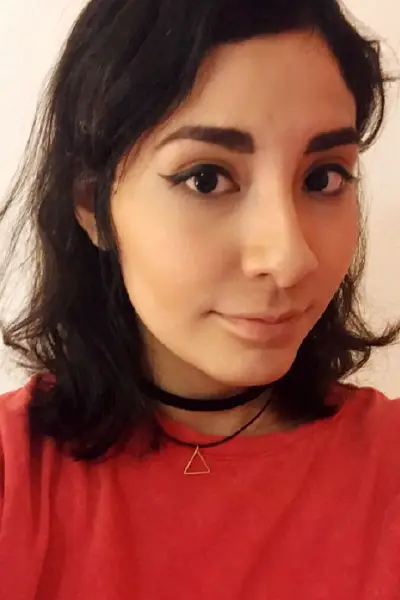Meet Courtney Cook
In both her creative writing and visual art, the University of Michigan student is a testament to the power of confessional expression.
By Maria Alvarado, Savannah College of Arts and Design
As a writer and a visual artist, Courtney Cook is familiar with the saying “Art imitates life.”
Before she became a Creative Writing major at the University of Michigan, she was working on art pieces that addressed topics most people don’t want to address. Her writing and art pieces are not afraid to show what’s inside her mind. In this way, Cook is creating “honest art” that impacts those around her.
Being an artist, feminist and a leader in her college community (president and founder of UM’s Zeta Omega Eta), Cook knows the true value of being able to express herself, and just how important self-expression is today’s society.
I was able to talk to her about creating art that communicates emotions that everyone has but is afraid to show, and the impact that it has had in her life.
Maria Alvarado: Tells us about your school and major.
Courtney Cook: I go to the University of Michigan. Originally, when I entered Michigan, I was in their Penny W. Stamps School of Arts and Design as an Arts and Design major. However, I had gone to the Chicago Academy for the Arts for high school and was a Creative Writing major there, and I decided that I wanted to pursue writing, even though I had thought I wanted to pursue arts. So, I made Creative Writing my major and Visual Arts my minor.

MA: Besides your previous preparation in high school, were there other reasons why you decided to transition from visual arts to writing?
CC: I felt like I wasn’t getting the opportunity to take as many academic classes as I would in another major. I could generally only take three credits, a.k.a. one traditionally academic class each semester, and the rest were studios. Most of my arts practice—whether creative writing or visual arts—is influenced by the things I learn in more traditionally academic settings, so I felt that I was becoming uninspired without the opportunity to take more academic classes. I thought switching would give me the opportunity to take more classes in other majors that interested me.
MA: What inspires your work?
CC: I think most of my work is inspired by relationships that I’ve had—love, sex and how that plays out. I like to explore different types of love, whether it is familiar, romantic or friendship, the different ways those loves are expressed and how one becomes close with people. So, I like to explore love languages, the way different people express love and the way I feel my relationships are formed through that.
MA: Is there a specific message to your pieces?
CC: I don’t think I ever go into making a piece with a specific intention. I think art and writing are ways for me to be able to understand myself more, so the message is generally unknown until I make the piece. At the end, I can kind of reflect and say, “Okay, I think this piece is saying this,” or something like that. But for the most part, I think that art is just a way for me to understand myself more and comprehend the experiences I have had. So it’s less of a message and more of a process of understanding.
MA: Since you are familiar with both writing and visual arts, would you say that you are more comfortable working with one medium?
CC: I would say that I’m more comfortable working with writing. I think it’s partially because I have had more formal training with writing, but also my mom is a writer (Trish Casey Cook) and I’ve grown up watching her write. She’s published five young adult novels, and I think watching her write inspires me to write myself.
And, while I’ve always been interested in visual arts, I think I have a lot of “impostor syndrome” around them, and don’t have the full capability of creating what I want to, whereas with writing, I feel that I have everything I have need at my disposal. I’m capable and I don’t doubt myself as much, which allows me to feel more comfortable creating so I create more with my writing.
MA: Do you go have a special process for your writing? Do you ever get stuck or go through writer’s block?
CC: I usually come upon something that inspires me: an image or an experience, or a line that I get stuck in my head. Once I get that hint of inspiration, I tune out everything else, start building up and see where that takes me.
Ever since I started working with poetry in high school, and now that I’m pursuing creative non-fiction in college, I often worry that I don’t have enough experiences or that I will run out of things to write about; that can become really paralyzing. I definitely get writer’s block, but because I have deadlines I just have to push through it.
When I get writer’s block, I try to remember that not everything I write can be amazing, and I try to be grateful that I was able to write. I think writing is a muscle, so even if I create something that I’m not particularly proud of, I know that in the long-term it will help me create something great.
MA: As a feminist, do you consider art to be a crucial part in the empowerment of women?
CC: I definitely do. I think that it’s such an important way to allow women to feel that their voices aren’t been silenced. There are so many instances in daily life where women feel frowned-upon or un-heard.
It’s difficult with problems in terms of, for example, the discrepancies between how many males’ works are shown at the MOMA in comparison to women’s and things like that.
I feel like many times, women’s work is trivialized, viewed as “women’s work” and not as fine art.
Even with these obstacles, having the ability to feel heard and find a community in the arts that supports you and believes in you is so important to the empowerment of women, and just feeling understood and heard.
MA: Some of your art pieces are very feral. How do people usually react to your art pieces? Do you ever get comments about your work?
CC: Most of the comments I receive are in the classroom setting. But I think it would be a lot harder if I was currently actively publishing my work online. Especially releasing the pieces that are most personal because I think that the internet can be super cruel. That cruelty doesn’t have as much place in a classroom.
A lot of times when I’m presenting a piece in a class, I will start by apologizing, like, “I’m sorry I wrote about doing drugs and having sex.” My teachers always tell me not to do that, because I shouldn’t have to apologize for writing and showing the emotion that I am showing. As a writer and an artist, I try hard to not feel that I’m being inappropriate by talking about relatable experiences.
Just after the elections, I was feeling very distraught. I was an avid Bernie supporter, and later an avid Hillary Clinton supporter, and I was felt so distressed about everything that I ended up writing an essay about my search for God in a time where I couldn’t understand what was happening in the world. I turned it in for class and this girl, with whom I don’t usually have contact, handed it back streaming with tears, saying that she was deeply touched by it.
She ended up writing me a 750-word letter about her experience reading it, and that was a really humbling moment for me, to realize that people can actually find myself in them, even if we come from different backgrounds.
I think it’s so cool how writing can breach a barrier between people who don’t seem like they would have anything in common.
MA: Has creating art that impacts people changed the way you perceive the issues you address in your pieces?
CC: A lot of times I have experiences that I don’t necessarily think much about, maybe because I don’t have the time to dwell deeper into it, or I’m scared or I don’t feel like it. But, writing gives me the chance to sit down and ask myself how I truly feel about these experiences. Through writing, I’m able to connect experiences that I wouldn’t usually see as connected, like, “Wow, this moment when I was little with my dad makes so much sense in the context of this friendship I’m currently having.”
If I wasn’t a writer, if I wasn’t an artist, I wouldn’t have that opportunity to understand myself and how the different experiences that I have had have impacted me or shaped me; I think that is a blessing in writing.

Being dedicated to non-fiction writing has given me this opportunity to look at experiences that were negative and turn them into something beautiful. That’s really empowering. One of the pieces that I made when I was still in the art school was an experimental film, “My Rapist Doesn’t Know He’s A Rapist,” about being raped when I was fifteen, and that is something that gave me power in a situation where I felt I didn’t have any. Having the ability to make it into something that I can control, I found that beautiful. Creating art changes how I perceive my experiences, and that’s something I’m really lucky to have in my life.
MA: In the future, where do you want to take your art? Do you plan to continue your career as an artist after college?
CC: Recently I have come to the conclusion that I would like to be a creative writing professor. In the last two years, I have had two writing professors who have completely changed my life, just in the way they taught. I would like to be that teacher for at least one person. I definitely want to continue my writing.
In my personal life, I want to be immersed in a community of writers and artists. As a visual artist, I feel like I will always make art. Even if I’m not sure if I will end up showing it in a gallery, I find a deep solace in creating things and would love to keep doing that forever.

















